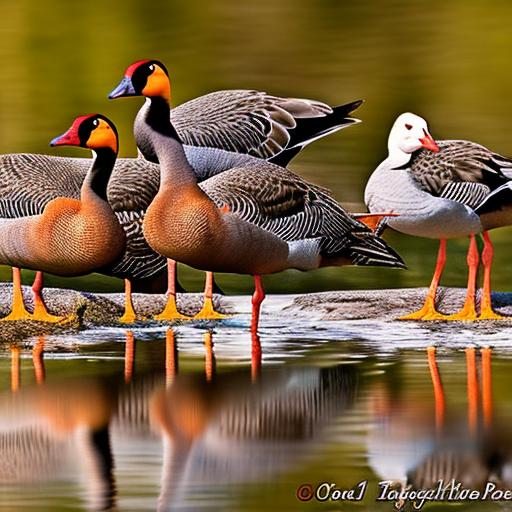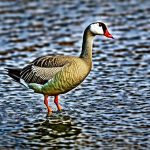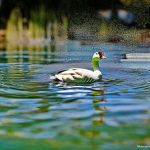Geese invading yards and causing problems is a common issue that many homeowners face. These large birds can be quite a nuisance, leaving behind droppings, damaging property, and even posing health risks. If you find yourself dealing with geese in your yard, it’s important to understand their behavior and implement effective strategies to keep them away.
Key Takeaways
- Geese can be a nuisance in your yard, causing damage and leaving droppings.
- Understanding their behavior can help you find effective ways to keep them away.
- Geese can pose a danger to humans, especially during nesting season.
- Natural methods like landscaping and water deterrents can help keep geese away.
- Physical barriers, scare tactics, and repellents can also be effective in deterring geese.
Understanding the behavior of geese
Geese are attracted to yards for several reasons. One of the main reasons is the availability of food. Geese are herbivores and feed on grass, plants, and grains. If your yard has a lush green lawn or a garden with plenty of vegetation, it becomes an attractive feeding ground for geese.
Another reason geese are attracted to yards is for nesting purposes. Geese typically build their nests near bodies of water, but they may also choose yards that provide a safe and secluded environment. They prefer areas with tall grass or shrubs where they can build their nests and raise their young.
Why geese can be a nuisance
Geese can cause a variety of problems in your yard. One of the most obvious issues is the mess they leave behind. Geese droppings are not only unsightly but can also create an unpleasant odor. They can cover your lawn, walkways, and even your patio furniture.
In addition to the mess, geese can also damage your property. They have strong beaks that they use to tear up grass and vegetation while feeding. This can result in bald patches on your lawn or destroyed flower beds. Geese may also trample over plants and cause damage to fences or other structures in your yard.
The dangers of geese in your yard
While geese may seem harmless, they can pose potential health risks and safety hazards. Their droppings contain bacteria that can contaminate water sources and cause diseases such as E. coli and salmonella. If you have children or pets that play in your yard, they may come into contact with these bacteria and become ill.
Geese can also become aggressive, especially during nesting season. They may hiss, flap their wings, or even charge at humans or animals that they perceive as a threat. This can be dangerous, especially if you have small children or pets that may not be able to defend themselves.
Natural ways to keep geese away
There are several natural methods you can try to deter geese from your yard. One effective method is to make your yard less attractive to them by removing their food source. This can be done by regularly mowing your lawn, removing fallen fruits or berries, and keeping your garden well-maintained.
Another natural deterrent is the use of noise or motion. Geese are wary of unfamiliar sounds and movements. You can try using wind chimes, scarecrows, or even a motion-activated sprinkler system to startle them and make them feel uncomfortable in your yard.
Using physical barriers to deter geese

Physical barriers can also be effective in keeping geese away from your yard. One option is to install a fence around your property. Make sure the fence is at least three feet high and has no gaps that geese can squeeze through. You can also consider using netting or wire mesh to cover areas where geese may try to nest.
Another physical barrier option is the use of floating barriers in bodies of water near your property. These barriers create a visual deterrent for geese and prevent them from accessing your yard from the water.
Scare tactics to keep geese at bay
Scare tactics can be an effective way to keep geese away from your yard. One common scare tactic is the use of decoys. Placing a fake predator such as a plastic owl or coyote in your yard can deter geese from approaching. However, it’s important to move the decoy regularly to prevent geese from becoming accustomed to it.
Another scare tactic is the use of noise. You can try using noisemakers such as air horns or banging pots and pans together to startle geese and make them feel unwelcome in your yard. Just be mindful of noise regulations in your area and consider the impact on your neighbors.
Repellents and deterrents for geese
There are various types of repellents and deterrents available for geese control. One option is the use of taste repellents. These products are applied to grass or vegetation and make it unpalatable for geese. They typically contain a bitter or spicy substance that geese find unpleasant.
Another option is the use of visual deterrents such as reflective tape or balloons with large eyespots. These visual cues can confuse and intimidate geese, making them less likely to stay in your yard.
The importance of regular maintenance
Regular maintenance is crucial in keeping geese away from your yard. By keeping your lawn well-maintained, you reduce the attractiveness of your yard to geese. This includes mowing regularly, removing fallen leaves or debris, and trimming shrubs or bushes where geese may try to nest.
It’s also important to address any water sources in your yard that may be attracting geese. This can include fixing leaky sprinklers or drainage issues that create puddles or standing water.
When to seek professional help for geese control
In some cases, it may be necessary to seek professional help for geese control. If you have tried various methods and are still experiencing issues with geese in your yard, a professional wildlife control service can provide effective solutions tailored to your specific situation.
Signs that indicate you need professional assistance include aggressive geese that pose a safety risk, large flocks of geese that are causing significant damage to your property, or persistent geese that are not deterred by natural or physical barriers.
Dealing with geese in your yard can be a frustrating and challenging problem. However, by understanding their behavior and implementing effective strategies, you can successfully deter geese from invading your yard. Whether you choose natural methods, physical barriers, scare tactics, or repellents, it’s important to be consistent and proactive in your approach. By taking action to prevent geese from invading your yard, you can maintain a clean and safe outdoor space for you and your family to enjoy.
If you’re looking for effective ways to keep geese away from your yard, you might also be interested in learning about how to create a safe and comfortable interior for your chicken coop. Poultry Wizard offers a helpful article on chicken coop interior ideas that can enhance the well-being of your feathered friends. From proper ventilation and lighting to choosing the right bedding materials, this article provides valuable insights to ensure your chickens have a cozy and functional living space. Check it out here!
FAQs
What are some common problems caused by geese in yards?
Geese can cause damage to lawns, gardens, and landscaping. They can also leave behind droppings that are unsightly and can carry diseases.
What are some natural ways to keep geese away from your yard?
Some natural ways to keep geese away from your yard include planting tall grasses or shrubs, using decoys or scare devices, and using reflective surfaces to deter them.
What are some humane ways to keep geese away from your yard?
Humane ways to keep geese away from your yard include using noise deterrents, such as air horns or whistles, and using motion-activated sprinklers.
What are some commercial products that can be used to keep geese away from your yard?
Commercial products that can be used to keep geese away from your yard include bird repellent sprays, electronic bird deterrents, and bird netting.
Is it legal to harm or kill geese to keep them away from your yard?
No, it is not legal to harm or kill geese to keep them away from your yard. Geese are protected under federal law, and harming or killing them can result in fines and other penalties.
Meet Walter, the feathered-friend fanatic of Florida! Nestled in the sunshine state, Walter struts through life with his feathered companions, clucking his way to happiness. With a coop that’s fancier than a five-star hotel, he’s the Don Juan of the chicken world. When he’s not teaching his hens to do the cha-cha, you’ll find him in a heated debate with his prized rooster, Sir Clucks-a-Lot. Walter’s poultry passion is no yolk; he’s the sunny-side-up guy you never knew you needed in your flock of friends!







